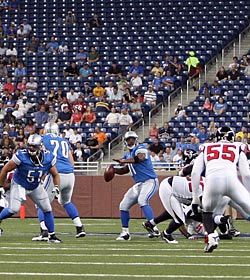Blackouts and the NFL
Gregg Doyel from CBS Sportsline has a good article about giving blackouts a break during a recession. The NFL put the fans first? What a concept and one that will never happen.
‘m not a big advice guy. Fire this coach, boycott that team? Not for me. I’ll complain about some things, and I’ll make fun of others. But tell another person what to do? I won’t tell another person what to do.
Except for today.
When I tell NFL commissioner Roger Goodell to get rid of the NFL’s television blackout policy.
 |
|
| Economic conditions, not a lack of fans, are leaving many seats open. (US Presswire) |
Not forever, mind you. I’m not telling Goodell to wad up the blackout policy and throw it into the permanent delete file. But I am telling him to stash it in the same holding bin that has Donte’ Stallworth’s 2009 football season. Give the blackout policy a one-year suspension, and then — like Stallworth’s application for reinstatement in 2010 — reconsider the whole thing next year.
The blackout policy isn’t inherently evil. But at this moment it is absolutely inappropriate.
• Goodell talks blackouts | Ratto: Plenty of tickets
People in this country will do almost anything to go to an NFL game. They’ll get on a waiting list for season tickets that, in Green Bay, could last 30 years. They’ll fight the traffic in New York to get to the nasty Meadowlands where they will freeze their ass off while being subjected to foul-mouthed drunks. They’ll buy a ticket for $100 and pay $30 for parking and then be hit with price-gouging costs for nachos and beer. They’ll do it because they love professional football, which replaced baseball a long time ago as our country’s national pastime. They’ll do it because they are loyal to this sport, and to this league. No sports league has more loyal fans than the NFL.
It’s time for the NFL to reward that loyalty.
Because people in this country will do almost anything to go to an NFL game — and this year, they can’t go.
Some are going, sure. Lots are going. But not enough are going, and that could lead to television blackouts in nearly one-third of the markets. Any team that hasn’t sold out its tickets within 72 hours of kickoff faces a local blackout. That includes my team, and my market, here in Cincinnati — but don’t misinterpret my motives. I’m not trying to get the blackout lifted so me or my friends can watch the Bengals. Watching a Bengals game, for most of us around here, isn’t a treat. It’s punishment. And I won’t do it. If the Bengals were on every channel on my TV except for the Home Shopping Network, I’d click over there to see what that Ginsu knife is all about.
But most cities have a different relationship with their NFL team than we have here in Cincinnati with the Bengals. Most cities need their team. Love it. Support it. And they have supported their teams for years, supported them to the extent that new stadiums are popping up all over the country, including that $1.2 billion monstrosity in Dallas. Salaries are astronomical, and why is that? Because people like you have bought tickets, or jerseys, or whatever else you’ve bought to support your NFL team.
Now it’s the NFL’s turn to support you, and not just for one weekend, though that would be a start. Eliminating the blackout rule for the first weekend of the season would be an enormous statement that the NFL understands and appreciates its place in the American fabric. One week would be fabulous, but one full season would be appropriate.
And I say this knowing the blackout rule has its place. NFL owners spend all kinds of money on their teams, and they need to recoup that money in ticket sales. If the games were on television every week, it would cut into ticket sales. It wouldn’t kill ticket sales, because there is no replacing the atmosphere of a game, but it would eliminate some buyers. That’s obvious.
Most of the time, the blackout rule provides the necessary motivation for a fan base to buy a ticket. If they want to be sure they’ll see the game, they get a ticket. It works. Last year, nine games were blacked out. That’s nine games out of 256, or about 3.5 percent. Blackouts happened in Detroit, Oakland and St. Louis.
Nine blackouts all year? That’s incentive. That’s a carrot.
Blackouts in 10 or 12 cities? That isn’t a carrot. That’s a tire iron to the temple.
And this tire iron is hitting places you wouldn’t believe. The areas around San Diego include people with some of the highest per-capita income in the country, but the Chargers already have had their first exhibition game in four years blacked out … and they’ll have another one blacked out this week. Cleveland loves its football, needs its football like almost no other market, and the Browns nearly had an exhibition game blacked out as well. Exhibitions aren’t regular season games, but the trend is ominous. In Jacksonville, there is talk of the entire season being blacked out. People there cannot afford the average cost of a football ticket, which is roughly $72.
Who can afford that cost, anyway? It’s not just the ticket. It’s the ticket and the parking and the gas to get to and from the stadium, and the meal (or two) a fan will eat at the game. Add it up, and it’s more like $140. Multiply that by eight home games in 2009, and it’s more than $1,000. Who has $1,000 to throw around between now and December? Not me. Not lots of you. And even if you have it, that $1,000 might be better served in the bank, a security blanket for your October mortgage if you get laid off. How would you pay the mortgage in November? That’s a concern for another day.
In normal circumstances, NFL markets facing a blackout get rescued by a local business — a TV station, a factory owner — that splurges on the final 1,500 or so tickets that need to be sold before the 72-hour deadline. The NFL team still sells out and makes its money. The fans who can’t go to the game get to watch their team on TV. The local business pockets a huge supply of goodwill. Everyone wins.
This year, everyone will lose. Normal circumstances don’t exist. The gap between a sellout and a blackout is going to be more than 1,500 tickets, and even if it’s not, what company has the money to make such a goodwill gesture?
There are no heroes waiting to save the day. That’s why Roger Goodell must be that hero. We’ve loved the NFL for decades, but it’s time for the NFL to love us back. Give us our games. Abolish the blackout.









